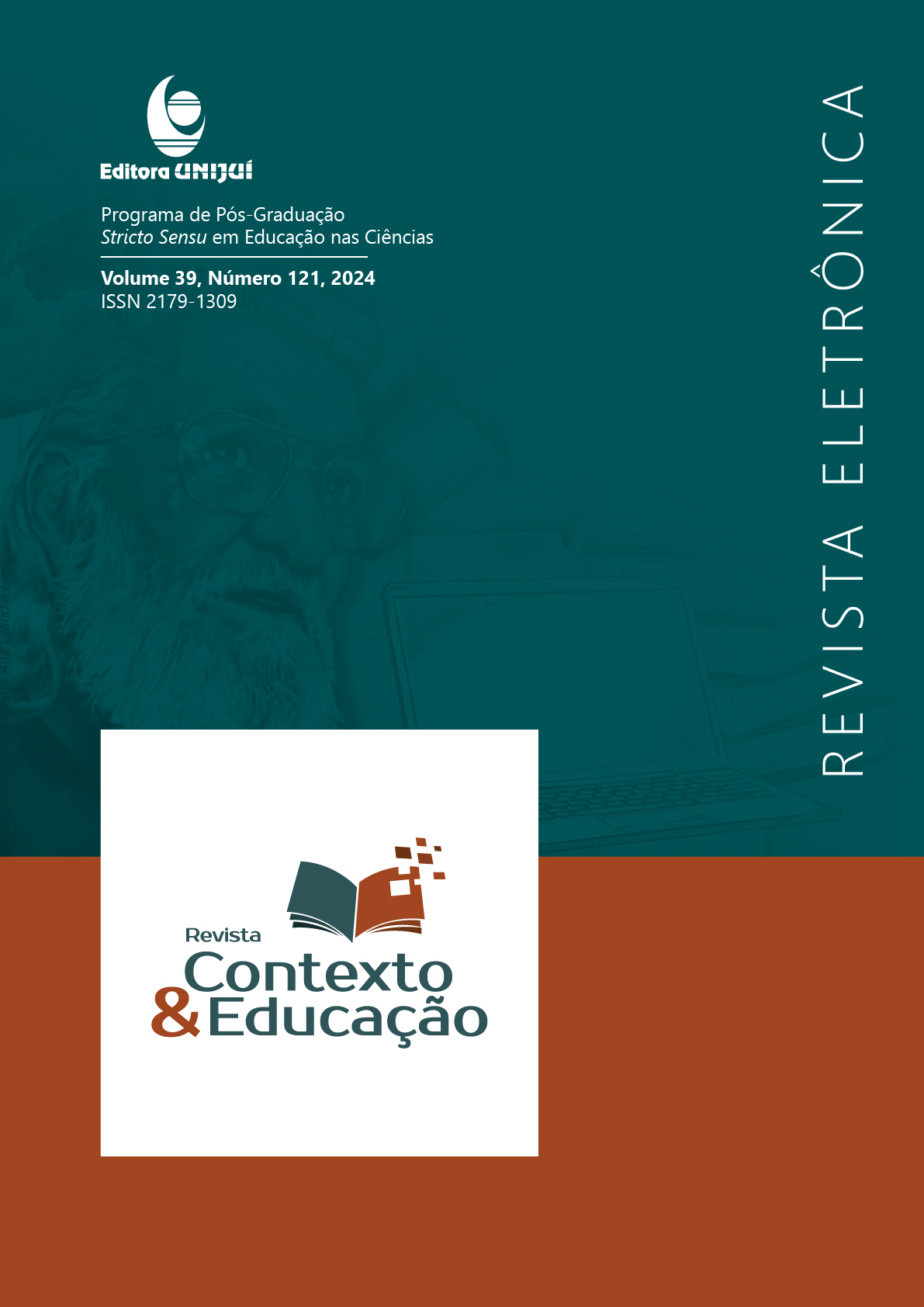Clima e tempo na educação básica: Experiência didática de observação e levantamento de dados com uso de termohigrômetro e pluviômetro
DOI:
https://doi.org/10.21527/2179-1309.2024.121.13087Palavras-chave:
Pluviômetro, Precipitação, Ensino, ClimaResumo
A atividade de levantamento de dados primários em ambiente escolar é um importante exercício a ser promovido cotidianamente, visto que os estudantes têm contato com metodologia de pesquisa sobre a realidade. Os conteúdos relacionados ao clima na Geografia e Biologia escolar podem estabelecer a relação entre os fenômenos climáticos e meteorológicos e sua influência no aprendizado dos estudantes. Dessa forma, a coleta de dados na prática, relacionada com os elementos físicos e sociais abordados na teoria, se coloca como importante no ensino das disciplinas. Neste sentido, objetivou-se levantar e analisar os índices pluviométricos e de temperaturas no município de Dores do Rio Preto, Espírito Santo, para mediar o processo de ensino e aprendizagem na escola. Durante o período de 24 meses (2019-2021), foram realizadas coletas de água pluvial. Para a coleta dos dados foi utilizada, um pluviômetro analógico e um termohigrômetro. Os resultados demonstraram que há variações relevantes durante os meses analisados. A abordagem do clima na educação básica contribuiu para significar os conteúdos, assim, os estudantes se mostraram mais interessados em estudar tais conteúdo. Neste sentido, o trabalho foi fundamental por relatar valores reais de precipitação e por permitir identificar as anomalias anuais da precipitação e temperatura.
Referências
ALMEIDA, Rosângela Doin de. A propósito da questão teórico metodológica sobre o ensino de Geografia. Terra livre. São Paulo: Marco Zero, nº8, 1996.
ANA – Agência Nacional de Águas. Caderno de Recursos Hídricos. Disponibilidade e Demandas de Recursos Hídricos no Brasil. Brasília-DF, 123p. 2005.
BARCELOS, Eduardo Álvares da Silva. Antropoceno ou Capitaloceno: da simples disputa semântica à interpretação histórica da crise ecológica global. Revista Iberoamericana de Economía Ecológica Vol. 31, No. 1: 1-17, 2019.
BENTO, Peracini Isabela. A mediação didática na aprendizagem: A construção do conhecimento geográfico. Revista Contexto & Educação, 36(115), Ijuí, 2021. p.328–340, 2021.
CALLAI, Helena Copetti. O Estudo do Lugar e a Pesquisa como Princípio da Aprendizagem. Espaços da Escola. IJUÍ: Editora UNIJUI. Ano 12, n. 47, jan./mar. pp.11-14, 2003.
CALLAI, Helena Copetti. Aprendendo a Ler o Mundo: A Geografia Nos Anos Iniciais Do Ensino Fundamental. Cad. Cedes, Campinas, vol. 25, n. 66, p. 227-247, maio/ago. 2005.
CEMADEN, 2021. Pluviômetros. Centro Nacional de Monitoramento e Alertas de Desastres Naturais, 2021 Disponível em: www.cemaden.gov.br/o-que-sao-pluviometros/. Acesso em: 22 nov. 2021.
DIOGINIS, Maria Lucineide, DA CUNHA, José Jailton, NEVES, Fernando Henrique, CRISTOVAM, Wiilson. As novas tecnologias no processo de ensino aprendizagem. Encontro Nacional de Ensino, Pesquisa e Extensão, Presidente Prudente, 19 a 22 de outubro, 2015.
FERRETI, Eliane. Geografia em ação: práticas em Climatologia. Curitiba: Aymará Educação, 2012.
FISCARELLI, Rosilene Batista de Oliveira. Material didático: discurso e saberes. Araraquara: Junqueira & Martins Editoras, 2008.
FREIRE, Paulo. Pedagogia da autonomia: saberes necessários à prática educativa. 25. ed. São Paulo: Paz e Terra, 1996.
FREIRE, Paulo. Pedagogia do oprimido. 17 edição. Rio de janeiro: Paz e Terra, 1987.
GIRARDI, Gisele. Geografia do Espírito Santo: 5 º ano. São Paulo: FTD 2008.
IBGE - Instituto Brasileiro de Geografia e Estatística. 2021. Disponível em: https://www.ibge.gov.br/. Acesso em: 10 dez. 2021.
IBGE - Instituto Brasileiro de Geografia e Estatística. Cidades. 2010. Disponível em: https://cidades.ibge.gov.br/brasil/es/dores-do-rio-preto/panorama. Acesso em: 10 dez. 2021.
KAERCHER, Nestor André. Desafios e utopias no ensino de geografia. In:CASTROGIOVANNI, Antônio Carlos et al. (Orgs). Geografia em sala de aula: práticas e reflexões. 4. ed. Porto Alegre: UFRGS. p. 11-23. 2003.
LIBÂNEO, José Carlos. Teoria histórico-cultural e metodologia de ensino: para aprender a pensar geograficamente. In: XII Encontro de Geógrafos da América Latina (EGAL), Universidad de la República, Montevideo, Uruguay, 2009.
OMM. Organização Meteorológica Mundial. Calculation of monthly and annual 30 - year standard normals. Geneva (WMO). Technical document, v.341; WCDP, n.10. 1989.
PONTUSCHKA, Níbia Nacib (org). Para ensinar e aprender Geografia. 3 ed: São Paulo: Cortez, 2009.
ROOY, Pieter Van. A Rainfall Anomaly Index Independent of Time and Space. Notes, Weather Bureau of South Africa. p.14- 43, 1965.
SANTOS, Márcio Antônio Raiol, BENTES, Lívia Maria Neves, SERIQUE, Nádia dos Passos. Epistemologia da complexidade e metodologia de projetos na educação básica: caminhos possíveis para a inter e transdisciplinaridade: caminhos possíveis para a inter e transdisciplinaridade. Revista Contexto & Educação, 33(106), Ijuí, 2018. p. 21–40.
Downloads
Publicado
Como Citar
Edição
Seção
Licença
Copyright (c) 2024 Revista Contexto & Educação

Este trabalho está licenciado sob uma licença Creative Commons Attribution 4.0 International License.
Ao publicar na Revista Contexto & Educação, os autores concordam com os seguintes termos:
Os trabalhos seguem a licença Creative Commons Atribuição 4.0 Internacional (CC BY 4.0), que permite:
Compartilhar — copiar e redistribuir o material em qualquer meio ou formato;
Adaptar — remixar, transformar e criar a partir do material para qualquer fim, inclusive comercial.
Essas permissões são irrevogáveis, desde que respeitados os seguintes termos:
Atribuição — os autores devem ser devidamente creditados, com link para a licença e indicação de eventuais alterações realizadas.
Sem restrições adicionais — não podem ser aplicadas condições legais ou tecnológicas que restrinjam o uso permitido pela licença.
Avisos:
A licença não se aplica a elementos em domínio público ou cobertos por exceções legais.
A licença não garante todos os direitos necessários para usos específicos (ex.: direitos de imagem, privacidade ou morais).
A revista não se responsabiliza pelas opiniões expressas nos artigos, que são de exclusiva responsabilidade dos autores. O Editor, com o apoio do Comitê Editorial, reserva-se o direito de sugerir ou solicitar modificações quando necessário.
Somente serão aceitos artigos científicos originais, com resultados de pesquisas de interesse que não tenham sido publicados nem submetidos simultaneamente a outro periódico com o mesmo objetivo.
A menção a marcas comerciais ou produtos específicos destina-se apenas à identificação, sem qualquer vínculo promocional por parte dos autores ou da revista.
Contrato de Licença (para artigos publicados a partir de outubro/2025): Os autores mantém os direitos autorais sobre seu artigo, e concedem a Revista Contexto & Educação o direito de primeira publicação.


